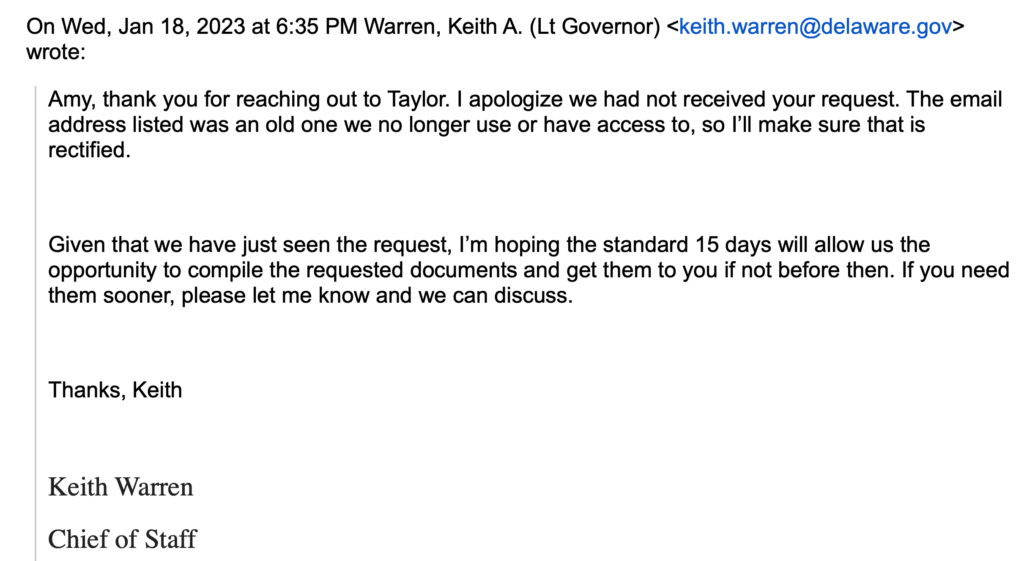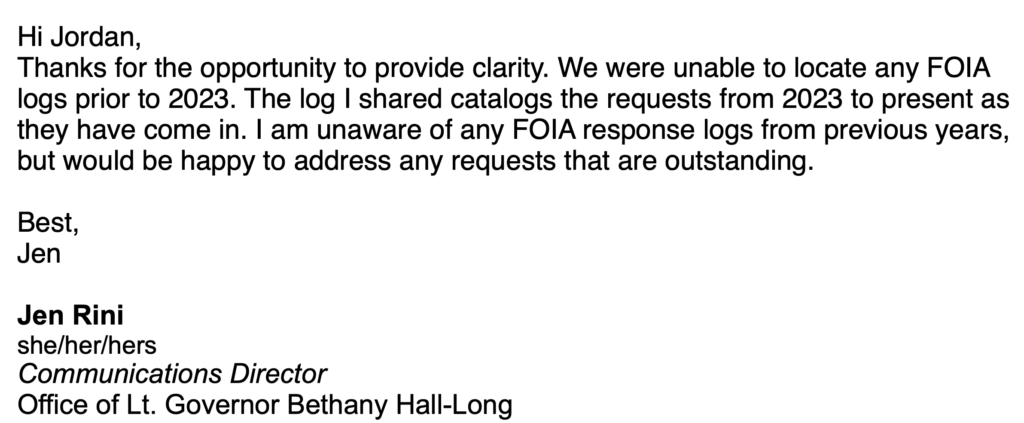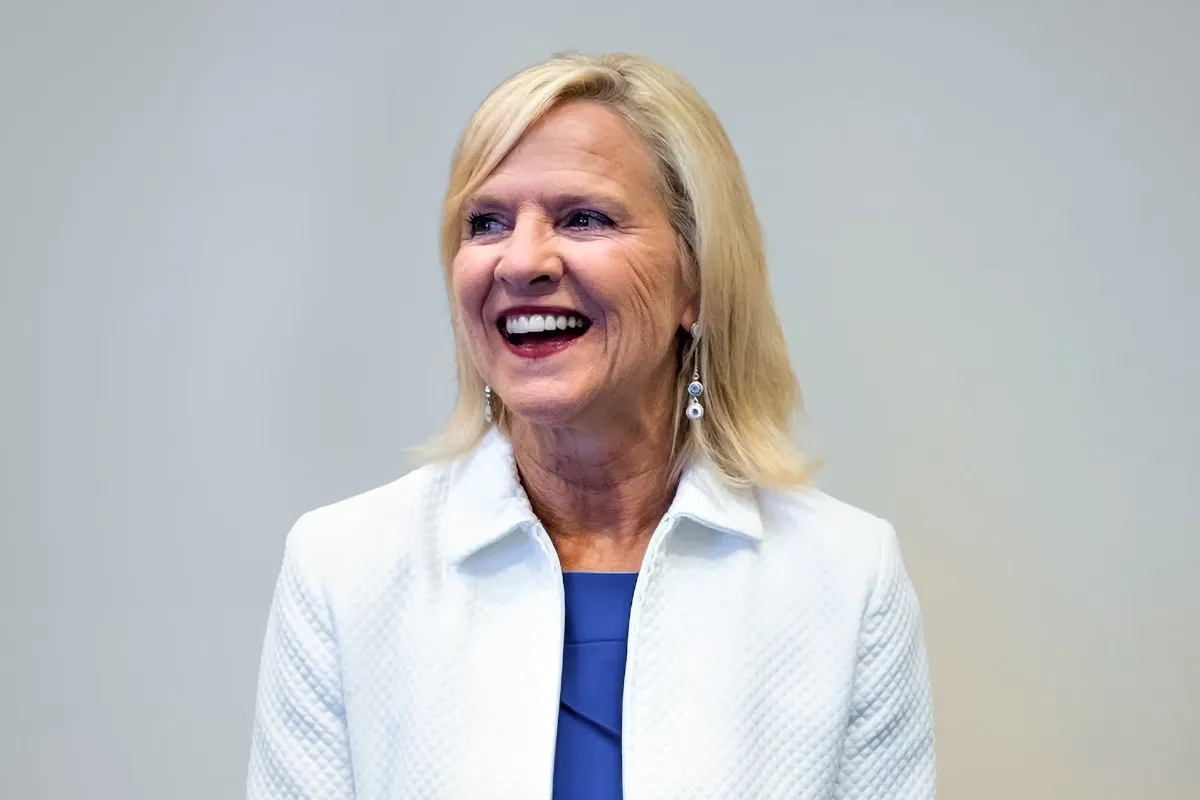The office of Lt. Gov. Bethany Hall-Long may have violated Delaware’s open records laws by not responding to Freedom of Information Act requests for several years encompassing nearly her entire time in office, from early 2017 to as late as October 2023, according to email correspondence and internal government records acquired by Delaware Call.
After the lieutenant governor’s office failed to comply with a FOIA request filed by Delaware Call on Aug. 16, Hall-Long’s director of communications admitted in an email today that there are no records of the office receiving or responding to FOIA requests prior 2023.
According to Delaware law, state agencies are required to respond to open records requests within 15 business days, and they must also keep records of those requests, known as FOIA logs, tracking the status of every request and if any records were provided.
So what happened? A three-week investigation by Delaware Call has revealed that Hall-Long’s office knew about a problem with their FOIA submission portal and response system but did not immediately fix it, causing untold numbers of open records requests to go unanswered.
Wrong email and missing documents
Back in December 2022, local FOIA sleuth Amy Roe filed dozens of open records requests to learn more about the lead crisis involving several Delaware public schools. Roe heard back from every agency she submitted requests to, except the lieutenant governor’s office. After the legally mandated deadline of 15 business days passed, Roe contacted Hall-Long’s office about her request.
“I apologize we had not received your request,” the lieutenant governor’s chief of staff Keith Warren responded in an email on Jan. 18, 2023. “The email address listed was an old one we no longer use or have access to, so I’ll make sure that is rectified.”

Warren then asked for 15 more business days to fulfill the request, but Roe balked.
“I find it somewhat appalling that the FOIA form that the public is required to use to submit a FOIA request goes to a dead email,” she wrote, explaining that the online portal was sending requests to the email address [email protected]. But according to Warren, that email was no longer being checked. The current email address is [email protected]. “This is really unacceptable. I don’t think an additional 15 business days is appropriate. If the documents aren’t provided by Monday at the end of day, I will submit a complaint to the AG.”
Roe chose not to contact the attorney general’s office, and Hall-Long’s office responded to the FOIA request a few days later and that was that. But did Hall-Long’s chief of staff keep his word? How long did it take her office to fix the FOIA problem?
The lieutenant governor’s office has no records of other FOIA requests or responses for another nine months — until October 2023 — when AP reporter Randall Chase submitted a request for correspondence between Hall-Long and several other individuals. The request was submitted on Oct. 2, 2023, but once again her office did not respond within the legally mandated deadline, prompting Chase to file a petition with the attorney general’s office.
The lieutenant governor’s office received a copy of Chase’s petition on Oct. 24 and responded the same day, indicating their intent to fulfill the original FOIA request. Apparently satisfied with their response, Chase did not pursue the complaint and so the attorney general did not post a legal opinion to the website. After this, the lieutenant governor’s FOIA logs show frequent and regular requests and responses, similar to every other state agency.
“State officials have a responsibility to the public when it comes to open records requests. The law is clear,” said Jack Flaherty, who sits on the board of directors of the Delaware Coalition for Open Government. “It’s up to the agency to have a working email on the FOIA portal and respond within 15 days.”
Delaware Call filed an open records request with the lieutenant governor’s office on Aug. 16 for FOIA request logs dating back to January 2018. FOIA logs are routine documents that all state agencies are required to maintain and must include specific information, including the nature of the request, names of government employees who reviewed the FOIA request, the outcome of the request, and more.
Hall-Long’s office only responded to the request after 5:00 p.m. on the 15th business day, and only after being advised that Delaware Call would file a complaint with the attorney general’s office. But even then, the logs only dated back to January 2023 and contained numerous omissions.
Delaware Call filed a complaint on Sept. 9, 2024, urging the attorney general to force Hall-Long to fully comply with the FOIA request.
The next day, the director of communications for the lieutenant governor’s office, Jennifer Rini, responded to Delaware Call and admitted that they have no FOIA logs, and therefore no records of FOIA requests, prior to 2023.
“I checked to see why our record of FOIA requests was so brief and it turns out we do not have any record of receiving FOIA responses prior to 2023,” Rini said. “I’m so sorry about that, I should have clarified.”
Delaware Call asked Hall-Long’s office for comment, but they have not responded as of publication.

Pattern of FOIA abuse in Delaware
Did Hall-Long’s office know of the FOIA problem before their correspondence with Amy Roe back in January 2023? Even if they didn’t, they probably should have.
A similar FOIA problem ensnared former state auditor Kathy McGuiness. Back in 2021, the same AP reporter, Randall Chase, submitted a request for the auditor’s FOIA logs from 2018 to 2021. When the request was not fulfilled within 15 business days, Chase filed a petition with the attorney general. Only after receiving a copy of the petition did the auditor’s office provide incomplete FOIA logs, which the AP challenged — yet again.
Ultimately, the attorney general’s investigation determined that the online FOIA portal was sending record requests to a defunct email account over a period of several years and, as a result, McGuiness’ office failed to properly maintain logs of public records requests, according to a legal opinion issued on Oct. 25, 2021.
“FOIA coordinators should not be in the habit of retrospectively creating or substantially revising FOIA logs to comply with FOIA requests for FOIA logs,” wrote Chief Deputy Attorney General Alexander S. Mackler — adding in a footnote: “The problem, it appears, was that the FOIA portal was automatically sending FOIA requests for [Auditor of Account] records to a defunct email account for a former . . . employee. We understand that that issue has been resolved.”
Resolved perhaps for the auditor’s office, but what about the lieutenant governor?
Despite the FOIA problem being highlighted by an AP reporter and the story republished in other local news outlets, which is unlikely to have escaped the attention of media professionals in the state government, Hall-Long’s office appears to have made the same failures as McGuiness when it comes to following the state’s sunshine laws.
Delaware Call routinely engages in FOIA investigations to hold public officials accountable. Earlier this year, Delaware Call partnered with Invisible Institute, a Chicago-based nonprofit public accountability journalism organization, to file open records requests to all of Delaware’s police agencies to monitor the state’s oversight of so-called “wandering officers” who switch departments only to continue patterns of aggressive behavior toward civilians. Some police agencies refused to provide basic information about the officers they employ, so with help from the ACLU of Delaware, Delaware Call filed a lawsuit against the state to gain access to that information.

